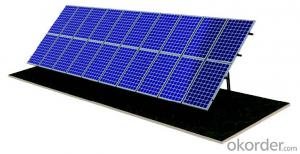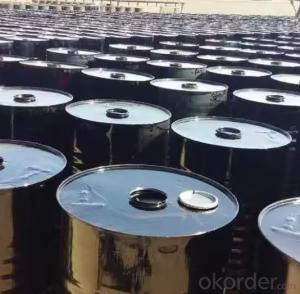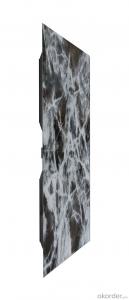solar system--ground system
- Loading Port:
- China Main Port
- Payment Terms:
- TT OR LC
- Min Order Qty:
- -
- Supply Capability:
- -
OKorder Service Pledge
OKorder Financial Service
You Might Also Like
Packaging & Delivery
Packaging Detail:Normal package seaworthy
Delivery Detail:15 days
Specifications
Easy installation Competitive price TUV&SGS test report & CSA certification 15-warranty
Specifications
1) Super smooth beautiful appearance,outstanding quality,large supply.
2) Available in customized surface finishes.
3) Well machined,for example,cutting,drilling and milling with excellent tolerance.
4) Meet with customer’s designs and supply you best price.
5)Usages:Supply for solar panel modules.
Technical characteristics
Installation site:
ground,hillside,and grassland
Installation angle
it is based on customers’ requirements
Installation height
it is basedon customers’ requirements
Solar panel type; with or without frame
Components arrangement :horizontal or vertical
Support track
aluminum alloy extrusion
Quality warranty
15 years
Advantages
1)Quick installation: with high degree of pre-installed rate, the system could be easily installed by using galvanized carbon steel rails for PV Stent, and specially designed connection parts of the PV bracket, which could reduce installation time and cost greatly.
2)Offer unmatched durability: with all structural components comprised of high class stainless steel and anodized aluminum alloy, it is designed for 25 years service life and backed by 15 years warranty.
3)Stand up to extreme weather: The SuninTek solar mount is designed to stand up to the extreme weather complied with the AS/NZ 1170 and other international structure load standard by the skilled engineer. The main support components also have been tested to guarantee its structure and load-carrying capacity.
4)Provide broad installation flexibility: These systems accommodate most commercially available framed solar panels , and they can scale easily from small to large, multi-megawatt installations.
5)Diversified Application: The PV mounting system produced can be adopted by various types of PV cells panels which you can find in the market. It can serve for both mini solar power system and huge plant with megawatt capability.
Main features
1. Installation cost savings.
2. Save installation time.
3. Increase the mechanical strength of solar energy mounting to ensure that wind requirements.
4. The outdoor for installation of solar energy.
5. Length can be customized according to customers.
6. Service life of up to 25 years.
7. Products through the international certification.
8. Stent material composition of the galvanized steel and aluminum.
9. 15 years system and structural guarantee.
10.Flexible post spacing withstands different wind & snow loads.
11. High quality material in Aluminium 6005-T5 and SUS 304.
12.Screws and nuts go with every components needed.
13.Mechanical calculation and reliability tested to ensure highest product quality.
- Q:How do solar energy systems contribute to reducing noise pollution compared to traditional power generation methods?
- Solar energy systems contribute to reducing noise pollution compared to traditional power generation methods because they do not rely on mechanical components like turbines or generators that produce loud noises. Instead, solar panels convert sunlight directly into electricity, resulting in a silent operation. This absence of noise helps in creating a more peaceful and less disruptive environment for both humans and wildlife.
- Q:Do solar energy systems require grounding?
- Grounding is crucial for solar energy systems, as well as any other electrical system, for safety reasons. It serves as a protection against electrical faults, lightning strikes, and other potential dangers. In a solar energy system, grounding is typically accomplished by connecting all metal components, such as solar panels, inverters, and racking systems, to a common ground. This is done by using grounding wires or cables that are linked to a grounding electrode, like a grounding rod or a metal water pipe. Grounding plays various important roles in solar energy systems. Firstly, it safeguards against electrical shock hazards by providing a safe pathway for electrical currents in case of a fault or malfunction. Additionally, grounding helps prevent damage to the system by diverting lightning strikes or other electrical surges away from sensitive components. Moreover, grounding is mandatory according to electrical codes and regulations. These codes ensure the safe installation and operation of solar energy systems, adhering to industry standards. Failure to comply with grounding requirements can lead to safety risks, equipment harm, or even legal consequences. In conclusion, grounding is an essential and significant aspect of solar energy systems. It guarantees the system's and its operators' safety, shields against electrical faults and lightning strikes, and ensures adherence to electrical codes and regulations.
- Q:How do solar energy systems affect the demand for traditional energy sources?
- Solar energy systems can significantly reduce the demand for traditional energy sources. As solar power becomes more accessible and affordable, more people and businesses are installing solar panels to generate their own electricity. This leads to a decrease in the reliance on fossil fuels, coal, or nuclear power, thereby reducing the demand for traditional energy sources. Ultimately, solar energy systems offer a sustainable alternative, minimizing the need for non-renewable energy and contributing to a greener and more energy-independent future.
- Q:Can solar energy systems be integrated with battery storage?
- Yes, solar energy systems can be integrated with battery storage. Battery storage allows excess solar energy to be stored and used when the sun is not shining, providing a reliable source of power even during periods of low sunlight. This integration enhances the efficiency and reliability of solar energy systems, making them more versatile and sustainable.
- Q:Can solar energy systems be used during power outages?
- Yes, solar energy systems can be used during power outages. They can provide a reliable source of electricity as long as they are equipped with a battery storage system to store excess energy generated during the day. This stored energy can then be used to power essential appliances and devices during power outages, ensuring continuous electricity supply.
- Q:Can solar energy systems be used in areas with high rainfall?
- Yes, solar energy systems can still be used in areas with high rainfall. While excessive rain and cloud cover can reduce the amount of sunlight reaching the solar panels, modern solar technology is designed to work efficiently even in sub-optimal conditions. Additionally, advancements like tracking systems and bifacial solar panels can help maximize energy production. So, while the overall output of solar energy may be slightly lower in regions with high rainfall, it is still a viable and sustainable option.
- Q:Can solar energy systems be used for powering refrigeration or cold storage facilities?
- Yes, solar energy systems can be used to power refrigeration or cold storage facilities. Solar panels can generate electricity, which can be used to power refrigeration systems and maintain cold temperatures for storage. This can be achieved through the use of solar-powered refrigeration units or by converting solar energy into electricity and connecting it to existing refrigeration systems. Utilizing solar energy for cold storage facilities can reduce reliance on traditional power sources and decrease carbon emissions.
- Q:Can solar energy systems be used for powering off-grid disaster response teams?
- Yes, solar energy systems can certainly be used for powering off-grid disaster response teams. Solar energy systems, such as photovoltaic panels or solar generators, can provide a reliable and sustainable source of power in remote or disaster-stricken areas where traditional power sources may be unavailable or disrupted. These systems can be easily deployed and are capable of charging communication devices, medical equipment, lighting, and other essential tools required by disaster response teams. Additionally, solar energy systems can reduce dependency on fossil fuels and contribute to a more environmentally friendly response to disasters.
- Q:Can a solar energy system be installed in a desert environment?
- Yes, a solar energy system can be installed in a desert environment. In fact, deserts are ideal locations for solar power generation due to the ample sunlight and lack of shading. The high temperatures in deserts can also increase the efficiency of solar panels.
- Q:How do solar energy systems affect property values?
- Solar energy systems can have a positive impact on property values. Studies have shown that homes equipped with solar panels tend to sell for a higher price compared to similar homes without solar systems. The added value can be attributed to lower energy costs, potential tax incentives, and the growing demand for sustainable and environmentally friendly properties. Additionally, solar panels are seen as a long-term investment that can provide homeowners with savings on electricity bills, further increasing the desirability of properties with solar energy systems.
1. Manufacturer Overview |
|
|---|---|
| Location | |
| Year Established | |
| Annual Output Value | |
| Main Markets | |
| Company Certifications | |
2. Manufacturer Certificates |
|
|---|---|
| a) Certification Name | |
| Range | |
| Reference | |
| Validity Period | |
3. Manufacturer Capability |
|
|---|---|
| a)Trade Capacity | |
| Nearest Port | |
| Export Percentage | |
| No.of Employees in Trade Department | |
| Language Spoken: | |
| b)Factory Information | |
| Factory Size: | |
| No. of Production Lines | |
| Contract Manufacturing | |
| Product Price Range | |
Send your message to us
solar system--ground system
- Loading Port:
- China Main Port
- Payment Terms:
- TT OR LC
- Min Order Qty:
- -
- Supply Capability:
- -
OKorder Service Pledge
OKorder Financial Service
Similar products
New products
Hot products
Related keywords


























